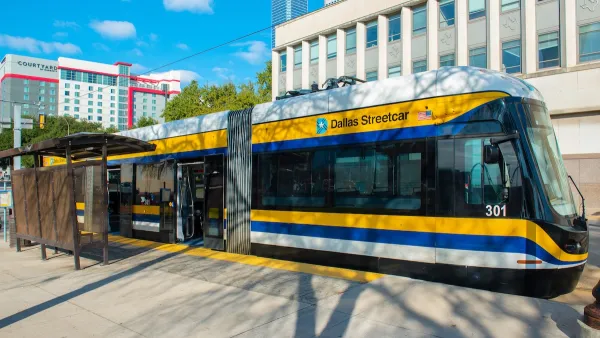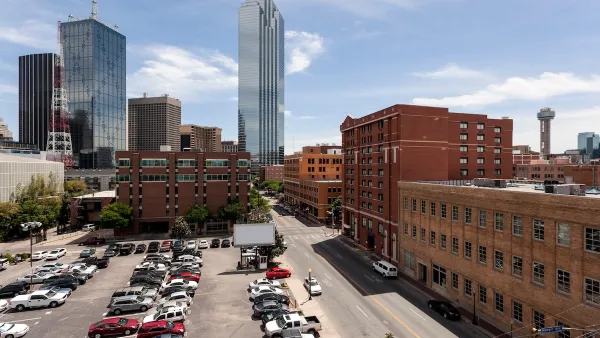Patrick Kennedy proposes an elegant and cost-effective way to deal with Dallas's aging elevated freeway and the city's "massive pent-up demand for walkable urban housing" - tear the sucker down.
The Texas Department of Transportation is considering two solutions for the aging 1.4 mile elevated freeway (IH-345) that runs between downtown and Deep Ellum: "either keep repairing the old road or rebuild it entirely, at a price likely in the hundreds of millions."
"There is a third option, though," argues Kennedy, "and it’s not getting the consideration it deserves." After two years of studying the IH-345 area, its traffic patterns, and the potential for redevelopment, he and a friend in real estate development have concluded that the best option is to tear the freeway down. He supports his position with an examination of the regional, local, short term, and long term impacts on traffic.
"Just as the system of freeways has shifted population outward, removing IH-345 from downtown would draw people into the city. It would reposition 245 acres so that it could be developed into walkable neighborhoods that could be home to 20,000 new downtown residents. Right now there is only $19 million in improvements on those 245 acres, and the city collects a mere $3 million per year in property tax revenue. By removing the highway, restitching the grid, and creating developable blocks, the city would see $4 billion in new investment within 15 years and generate $100 million a year in property tax revenue, based on our economic impact analysis."
"In order to set off the kind of building boom required to meet the massive pent-up demand for walkable urban housing," concludes Kennedy, "we must flip the downtown real estate equation so land costs are lowered and demand is increased. To do that, we must leverage the commonwealth’s best asset: land. Forget the traffic."
FULL STORY: How Dallas is Throwing Away $4 Billion

Planetizen Federal Action Tracker
A weekly monitor of how Trump’s orders and actions are impacting planners and planning in America.

Restaurant Patios Were a Pandemic Win — Why Were They so Hard to Keep?
Social distancing requirements and changes in travel patterns prompted cities to pilot new uses for street and sidewalk space. Then it got complicated.

Map: Where Senate Republicans Want to Sell Your Public Lands
For public land advocates, the Senate Republicans’ proposal to sell millions of acres of public land in the West is “the biggest fight of their careers.”

Maui's Vacation Rental Debate Turns Ugly
Verbal attacks, misinformation campaigns and fistfights plague a high-stakes debate to convert thousands of vacation rentals into long-term housing.

San Francisco Suspends Traffic Calming Amidst Record Deaths
Citing “a challenging fiscal landscape,” the city will cease the program on the heels of 42 traffic deaths, including 24 pedestrians.

California Homeless Arrests, Citations Spike After Ruling
An investigation reveals that anti-homeless actions increased up to 500% after Grants Pass v. Johnson — even in cities claiming no policy change.
Urban Design for Planners 1: Software Tools
This six-course series explores essential urban design concepts using open source software and equips planners with the tools they need to participate fully in the urban design process.
Planning for Universal Design
Learn the tools for implementing Universal Design in planning regulations.
Heyer Gruel & Associates PA
JM Goldson LLC
Custer County Colorado
City of Camden Redevelopment Agency
City of Astoria
Transportation Research & Education Center (TREC) at Portland State University
Camden Redevelopment Agency
City of Claremont
Municipality of Princeton (NJ)




























